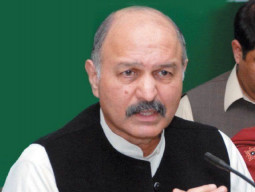Frustration weighed down his face. He introduced himself as Najeef, a resident of Mohmand Agency. Najeef sat on the green belt which divides University Road near Speen Jumat, under the shade of a small tree. As he started talking, anxiety poured out of every line on his face, controlling every fidgety movement, every gesture.
Two of his friends napped on the grass. Another friend, Barkat Khan, a teenager, rolled on his back, and stared silently at the sky. Unlike Najeef, Barkat had an air of acceptance about him.
As noisy traffic sped by, the rest of the men who slept on the green belt seem immovable; the bustle and the 42 degrees-Celsius heat was zoned out of their immediate consciousness. This is the footpath community of homeless in the city.
“I work as a daily labourer, mostly in construction, but there is no work today. I have not managed to get a single job in the past eight days,” Najeef told The Express Tribune.
“I sleep on the green belt. Maybe I earn Rs500 in a day, maybe I don’t.” Najeeb’s family has a small piece of land in Pindyali, Mohmand Agency, barely enough to feed the entire family for six months in a year. “After every two months, I go to my wife and children and give them Rs8,000 to Rs9,000 for expenses.”
Of Barkat
Najeef’s 17-year-old friend Barkat who belongs to Bajaur Agency said he was his parents’ first born. “I have to support my family; that’s why I came to Peshawar with other boys from my village,” he said. “But without education or skills, I have to look for daily labour,” he added. “There are not too many construction projects around, It’s been tough.”
“There is a community of at least 25 people who sleep on this green belt,” Barkat said his spot was the perfect one because of its close vicinity to a large mosque with washrooms and toilets, “People often distribute free food among the needy in the mosque.”
When asked why he chose to stick around in Peshawar, Barkat replied he has no ID card, making it near impossible to move to Lahore or Karachi where the job market is much more promising.
“I have many friends who can’t go to Lahore or Karachi because they can’t speak Urdu. They have to spend their life here on the roads and streets.” Barkat looked away and said, “They will never be able to escape, they will have no chance to get out of here, ever.”
Striking it rich
There are people from Mohmand and Bajaur agencies who moved to Peshawar, Lahore or Karachi and worked as labourers but have now managed to amass wealth. “They are our role models, but being homeless is a tough life,” reiterated Barkat.
Muhammad Rasool is a resident of Nowshera. His patch of green is outside Ameen Hotel on G T Road.
“We are four sisters and four brothers. My father was a cook in the Pakistan Army,” said Rasool. He explained his father wanted Rasool to follow in his footsteps and join the army but he refused. “I was never interested in gaining an education; for that matter, I was never interested in anything.”Now he and his other brothers are jobless and look for work every day.
Exploiting labour
“For routine work, the daily wage is Rs500,” said Rasool, “but I hardly get Rs300 per day as construction contractors know very well that homeless people like us will work for a pittance even Rs100.” Rasool has a wife and eight-month-old son.
“Nowshera is not that far away but I only go home once a week and give my wife Rs1,100 to Rs1,200 for expenses.” He repeated, “I just earn Rs300 a day. Do you know how much even the most basic meal costs? Rs70 to Rs80.”
Charity, which flows easier in Ramazan, makes it possible to save some money as people donate Iftari at mosques, he told The Express Tribune towards the end of the month of fasting.
According to Pakistan Muslim League-Nawaz leader from Mohmand Agency, Naveed Mohmand, it is an established norm in the agency for most men to leave home in search of work.
“They go to Lahore, Peshawar, Karachi and other parts of the country, leaving behind one or two men to take care of the household,” said Naveed.
“Mohmand is a desert where you will hardly find any drinking water, so the land is not cultivable,” he added. “This has forced our people to search for greener pastures, to try their hand at other jobs in other parts of Pakistan.”
NGOs and the government receive millions in aid from foreign donors but the money is never spent on what it is given for: development work in Mohmand, claimed the PML-N leader.
Published in The Express Tribune, July 29th, 2014.
COMMENTS (1)
Comments are moderated and generally will be posted if they are on-topic and not abusive.
For more information, please see our Comments FAQ

1730959638-0/trump-(19)1730959638-0-165x106.webp)




1723647989-0/Abu_dhabi_skylines_2014-(1)1723647989-0-270x192.webp)










I don't mean to be heartless, but from what's given here I figure that most of these men willfully ignored their education - learn, people, learn.